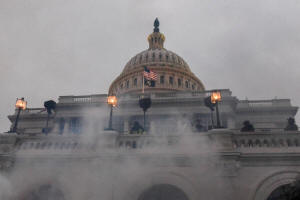Trump summoned to testify to Jan. 6 U.S. Capitol riot panel
 Send a link to a friend
Send a link to a friend
 [October 22, 2022]
By Patricia Zengerle [October 22, 2022]
By Patricia Zengerle
WASHINGTON (Reuters) -Former President
Donald Trump was ordered on Friday to testify under oath and provide
documents to the House of Representatives committee investigating the
Jan. 6, 2021, attack on the U.S. Capitol by his supporters.
The committee said it had sent a subpoena to Trump requiring documents
to be submitted to the panel by Nov. 4 and for him to appear for
deposition testimony beginning on or about Nov. 14.
Deposition testimony often refers to closed-door, videotaped questioning
of a witness on the record. Such testimony could be made public and
become part of a final report by the special panel.
"As demonstrated in our hearings, we have assembled overwhelming
evidence, including from dozens of your former appointees and staff,
that you personally orchestrated and oversaw a multi-part effort to
overturn the 2020 presidential election and to obstruct the peaceful
transition of power," the committee wrote in a letter to Trump on
Friday.

The committee is seeking a wide range of documents from Trump that would
detail communications he may have had over a period of several months
leading up to the Jan. 6 riot and beyond with lawmakers, Oath Keepers
and Proud Boys members, as well as associates and former aides,
including Roger Stone, Steve Bannon, Michael Flynn and Rudy Giuliani.
Additional documents, text messages and other communications being
sought relate to information detailing possible travel of people to the
Capitol on Jan. 6, 2021, communications relating to efforts to encourage
state legislatures or lawmakers to take actions that would have delayed
Congress' certification of the presidential election or changes in
states that would have certified an alternate slate of "electors" that
would support naming Trump as the winner of the 2020 election.
Trump, who regularly refers to the panel as the "unselect committee,"
has accused it of waging unfair political attacks on him while refusing
to investigate his charges of widespread election fraud.
He is not likely to cooperate with the subpoena and could simply try to
run out the clock on a committee whose mandate will likely end early
next year if Republicans win a majority in the House in November's
midterm elections.
Thousands of Trump supporters attacked the Capitol on Jan. 6, 2021,
after Trump delivered a fiery speech at a rally near the White House
featuring false claims that his defeat in the 2020 presidential election
by Democrat Joe Biden was the result of fraud.

[to top of second column]
|

Police clear the U.S. Capitol
Building with tear gas as supporters of U.S. President Donald Trump
gather outside, in Washington, U.S. January 6, 2021.
REUTERS/Stephanie Keith/File Photo

The assault saw rioters smash through glass and battle police. Five
people including a police officer died during or shortly after the
riot, more than 140 police officers were injured, the Capitol
suffered millions of dollars in damage and Pence, members of
Congress and staff were sent running for their lives.
The committee announcement came hours after Steve Bannon, a former
adviser to Trump, was sentenced to four months in federal prison for
refusing to cooperate with the panel's investigation. He is free,
however, pending his appeal.
PRIOR PRESIDENTIAL TESTIMONY
The committee made clear that congressional testimony by a former or
sitting president was not unprecedented. The letter listed seven
former presidents -- most recently Gerald Ford -- having testified
after leaving office. "Even sitting presidents, including Abraham
Lincoln and Gerald Ford" also appeared while still in the White
House, it said.
"In short, you were at the center of the first and only effort by
any U.S. president to overturn an election and obstruct the peaceful
transition of power, ultimately culminating in a bloody attack on
our own Capitol and on the Congress itself," Committee Chairman
Bennie Thompson and Vice Chair Liz Cheney wrote Trump.
Committee members have not said how they will proceed if Trump
disregards his subpoena.
Federal law says that failure to comply with a congressional
subpoena is a misdemeanor, punishable by one to 12 months
imprisonment. If the select committee's subpoena is ignored, the
committee would vote to refer the issue to the full House. The House
then would vote on whether to make a referral to the Department of
Justice, which has the authority to decide whether to bring charges.

The rioters were attempting to stop Congress' formal certification
of Biden's victory in the 2020 presidential election.
The House Jan. 6 select committee has held a series of hearings
making its case - via documents, live witness testimony and recorded
testimony from interviews conducted behind closed doors - that Trump
was largely responsible for the deadly assault on the Capitol.
They argued that the Republican planned in advance to deny his
election defeat, failed for hours to call off the thousands of his
supporters who stormed the Capitol and followed through with his
false claims that the election was stolen even as close advisers
told him he had lost.
(Reporting by Patricia Zengerle and Doina Chiacu; Additional
reporting by Richard Cowan; Editing by Alistair Bell and Daniel
Wallis)
[© 2022 Thomson Reuters. All rights
reserved.]
This material may not be published,
broadcast, rewritten or redistributed.
Thompson Reuters is solely responsible for this content. |